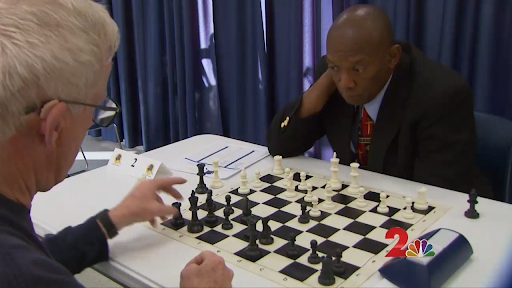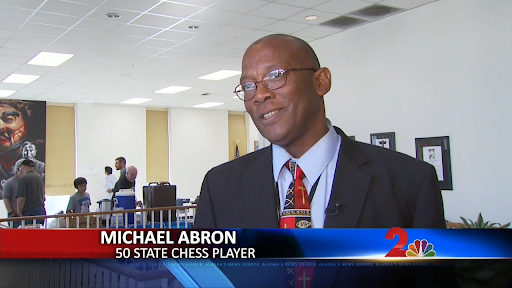A Chess Pioneer And His Pursuit Of Purpose
By Spencer Morgan
Founder and Chief Community Officer
 Mike Abron moved to St. Louis in 2019 to become a better chess player. St. Louis is the chess capital of the country, and Mike’s weekly schedule is built around open play times at his favored chess clubs and visiting with friends, most of whom are fellow chess enthusiasts.
Mike Abron moved to St. Louis in 2019 to become a better chess player. St. Louis is the chess capital of the country, and Mike’s weekly schedule is built around open play times at his favored chess clubs and visiting with friends, most of whom are fellow chess enthusiasts.
“Tuesdays, Thursdays and Saturdays, those are the regular days that I know I’ll have chess to play,” he tells me. “But I should also mention Wednesdays, because this good friend of mine and I, we go to the library and we’ll battle for three hours most Wednesdays from 3 to 6.”
Mike, who turned 70 in January but exudes the energy of a much younger man, says he probably walks 50 miles every week, between the traversing from his apartment to his various chess engagements and the regular nature hikes he does with his friend Jim. In the world of chess, Jim is a National Master (awarded by the United States Chess Federation – US Chess – for achieving a rating of 2200 or higher) and a chess coach at the St. Louis Chess Club.
“We joke that we’re the only two undercover Grand Masters in the state of Missouri, that nobody knows about but us,” Mike says with a laugh.
Mike maintains a 1500 rating (Grand Master status is 2600 and up), but since high school he has been chasing a dream to make his mark on the chess world. On Oct. 12, 2019 at the National Chess Day tournament in Anchorage, Alaska, Mike achieved just that when he became the first African American to play a rated US Chess tournament in all 50 states.
It is a feat only three others have achieved. For Mike, a retired math teacher who struggled most of his life to make ends meet, it was a feat made possible by his unrelenting determination and the support of his peers – old friends cheering him on and new chess buddies he made along the way. And one that enabled his current outlook on life.
“Live your life to the fullest,” he tells me. “Don’t put limitations on yourself. Might take you a while, but take your time and set your goal, and you’ll reach it. Might not be easy, but it’s achievable. But you got to reach out and grab it. It won’t grab you.”
Mike knows as well as anyone it is never too late to find your purpose.
 Around 2006, Mike was living in Loveland, Maryland teaching mathematics at Trinity College and playing lots of chess. Then life happened. His car got stolen and was used in a bank robbery, which caused a lot of annoying problems with the police. Then he learned that his beloved grandmother was going into hospice. He went to be with her in her final days.
Around 2006, Mike was living in Loveland, Maryland teaching mathematics at Trinity College and playing lots of chess. Then life happened. His car got stolen and was used in a bank robbery, which caused a lot of annoying problems with the police. Then he learned that his beloved grandmother was going into hospice. He went to be with her in her final days.
“She was like a mother to me, she raised me,” Mike says.
What followed was a paralyzing depression. Mike relocated to Youngstown, Ohio, to live with his father and rarely left the house outside of work for the next 10 years. He even gave up chess.
“I didn’t want to do nothin’,” he recalls. “I didn’t even want to go out anymore. You go through a feeling of depression – it can really get to you if you let it.”
After struggling to find steady work in Youngstown, Mike was eventually able to retire and draw on his Social Security benefit. But now, Mike didn’t need to leave the house at all. His father, Hubert, was concerned.
“He said, ‘Why don’t you get back into chess? You really liked it,’” Mike recalls.
Mike’s love affair with chess started when he inherited his older brother’s chess board. The year was 1968 and Mike was in junior high school in Knoxville, Tennessee. One night, he came down from his room to find his older brother and some of his friends playing a game Mike had never seen before. His brother was leaving for Vietnam that week and didn’t have time to teach him. He gave Mike his chess board and told him they would play when he got back. Young Mike got some books from the library and taught himself to play.
Mike joined the high school chess club. He started winning. He won the club tournament! He beat the chess teacher! He thought he might be the greatest chess player that ever lived. Then his club played a neighboring school, and lost on the first board.
“I began to see, hey, maybe I’m not as great as I thought I was,” he recalls. But he had discovered a love of playing and learning and finding mentors to help him elevate his game.
He studied math at University of Tennessee at Knoxville and got a master’s degree in 1979 to pursue a career in teaching math. Mike’s life took a number of turns – marriage, children, a stint as a minister, divorce, different jobs in different states. His interest in chess and the chess community ebbed and flowed as circumstances allowed.
In the early 2000’s, during his time in Maryland, Mike’s chess habit became his identity. Mike began calling himself the Chess Traveler. He developed a group of friends and mentors within the chess community in the surrounding area. Over a four year period he zigzagged across the East Coast, northeast and parts of the midwest in his blue Toyota Camry, hunting US Chess tournaments and spending nights at hostels, shelters and rest areas. He loved it! (Though it was definitely a drag when his car got mixed up in a robbery and the cops kept pulling him over.)
Mike remembers being mentioned in an article in Chess Life magazine titled ‘Dennison’s 50’ about a man named Dennison who had played a rated chess match in all 50 states. Mike was referenced in the piece among a short list of tournament players who also roamed the country, looking for matches. Records indicated that Mike had racked up a count of playing chess in 30 states! Remarkable!
Nearly a decade later, when his father’s question shook him from his funk, Mike was reminded of that article. He wouldn’t just get back into chess but rather he would fully commit to a notion that had only pricked his conscience when he read about Mr. Dennison’s accomplishment: the full 5-0. All fifty states.
Mike started making calls. His pal Col. Zachary ‘Zack’ Kinney, an influential figure in the African American chess community in Washington, D.C. and a member of the Black Knights Chess Club, was all in. He gave Mike a new nickname: The Chess Pioneer! He invited Mike to come stay with him and develop a ‘battle plan’ for the remaining 20 states. Zack also felt the historic nature of this mission merited proper documentation. He began researching and interviewing Mike for a book.
 On February 8, 2018, roughly two years after the idea had taken hold, Mike was armed with a road map and ready to set off on his quest to play tournaments in the remaining states. In their self-published book, The Chess Traveler and Pioneer, Col. Kinney details their plan of Mike achieving one state per week, and the many challenges that threatened its completion along the way.
On February 8, 2018, roughly two years after the idea had taken hold, Mike was armed with a road map and ready to set off on his quest to play tournaments in the remaining states. In their self-published book, The Chess Traveler and Pioneer, Col. Kinney details their plan of Mike achieving one state per week, and the many challenges that threatened its completion along the way.
In Colorado Springs, Mike made a new friend just in time. He was three states in, and was already running out of money. “It’s a four-prong budget,” Mike says. “You got to have your transportation. I always had to catch the bus, the train, or fly to Hawaii and Alaska. I had to have lodging, had to pay the entry fee, and then I got to eat something. So that got quite expensive.”
“I couldn’t have completed my journey if it hadn’t been for Paul Covington,” he adds.
Paul, then president of the Colorado Springs Chess Club, helped Mike revise his roadmap to visit the next states on budget. They would meet at the library so Mike could get back to the shelter before curfew.
I caught up with Paul by phone.
“Mike knew that his talent level wasn’t going to allow him to be a master, but he wanted to find a way that he could accomplish something in chess,” Paul tells me. “He was doing this stuff on the absolute thinnest shoe string budget…he’s a good guy but he is some kind of scattered.”
Mike would rely on Paul for the duration of his journey. He called him for directions while lost in the middle of Utah. Mississippi was a problem in that there were no chess tournaments to speak of. Call Paul!
The two men still talk on a monthly basis.
Mike’s co-conspirator, Zack Kinney, joined Mike for the last leg of his journey. In Anchorage, Zack watched as Mike was presented with a certificate from Alaska’s only chess club, Last Frontier Chess Foundation. Later, Mike was interviewed by the local tv news station.
“I told her, I said, ‘Look, I’m in my golden age. And I’m putting the gold in golden.’”
He left Alaska with $70 to his name and returned to his then new home of St. Louis. The chess capital of the country!
Today, Mike is living life to the fullest, playing chess and making friends everywhere he goes. That’s probably what he enjoyed most about his chess traveler and pioneer days, meeting new people.
“One thing I love about chess, people can be anybody from a hobo to the president of the United States,” he says. “And some presidents were quite good chess players. I’m not talking of the ones at present, as far as I know. I’m saying in the past, like old Ben Franklin was a great chess player. And there were others, you know, I can’t mention them. Then you got movie stars like Will Smith and Samuel Jackson, some other stars that are great chess players. So it gives you an opportunity to meet folks from all walks of life, like doctors, lawyers, engineers, and just average, mediocre people like myself.”